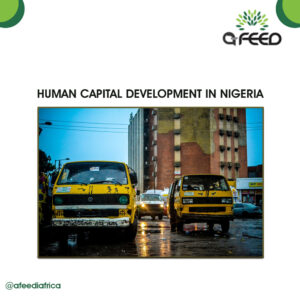HUMAN CAPITAL DEVELOPMENT IN NIGERIA
Human capital refers to the knowledge and skills that citizens possess that can effectively drive an economy. Countries with higher human capital experience improvements in the lives of their citizens and economic growth.

Nigeria ranked 150 of 157 countries in the World Bank’s 2020 Human Capital Index. There’s a need for the government to provide sustainable opportunities for investments in people.
In Adam Smith’s book “An Inquiry into the Nature and Causes of the Wealth of Nations,” he analysed wealth, knowledge, training and talents of a nation. He suggested that improving human capital through training and education leads to a more profitable enterprise.
Improving the State of Human Capital
Adjusting Imbalances
Despite Nigeria’s economic potential and resources, findings from the National Bureau of Statistics (NBS) shows that four out of ten Nigerians live in extreme poverty. The margin between the wealthy and the poor is ever increasing.
The citizens, especially those at the grassroots, lack access to good health, education, and sustainable skills.
Oftentimes, the government sees to their welfare during political activities. However, this is largely because their population is required to influence political decisions.
It is important for the government to provide policies that will help to reduce these imbalances.
Implementing these policies would reduce poverty by increasing the numbers of skilled and employable individuals in the society. We also discussed how economic inequality can be solved through income mobility here.
Diversifying from Oil
Gone are the days when Nigeria’s oil was in high demand.
The world is gradually moving towards more efficient sources of energy and power. Countries are now advocating for cleaner sources of energy.
These technologies are envisaged to not only combat climate change and security challenges but they are also able to reduce poverty and enhance economic growth.
Relying on the revenue generated from oil alone can lead to economic hazards in the future. The government should involve the private sector to promote a green economy.
Private institutions and individuals contribute to the demand and supply economy. Therefore, significant public investments into research would reduce unemployment.
Addressing Infrastructure Challenges
Well-planned infrastructure is important to improve human capital. It helps to reduce constraints to economic growth.
It also benefits the marginalized citizens in the society – women and rural communities.
Government policies should foster public-private partnerships to address infrastructural challenges.
Over the years, the failure of our leaders to execute their promises and mandates upon election has led to poor public service performance and lackadaisical attitude to national issues on the part of citizens.
While we recognize that not all labour is equal and there would always be a gap in the distribution of wealth in any society.
The government can make a difference by investing in the future of its people.
